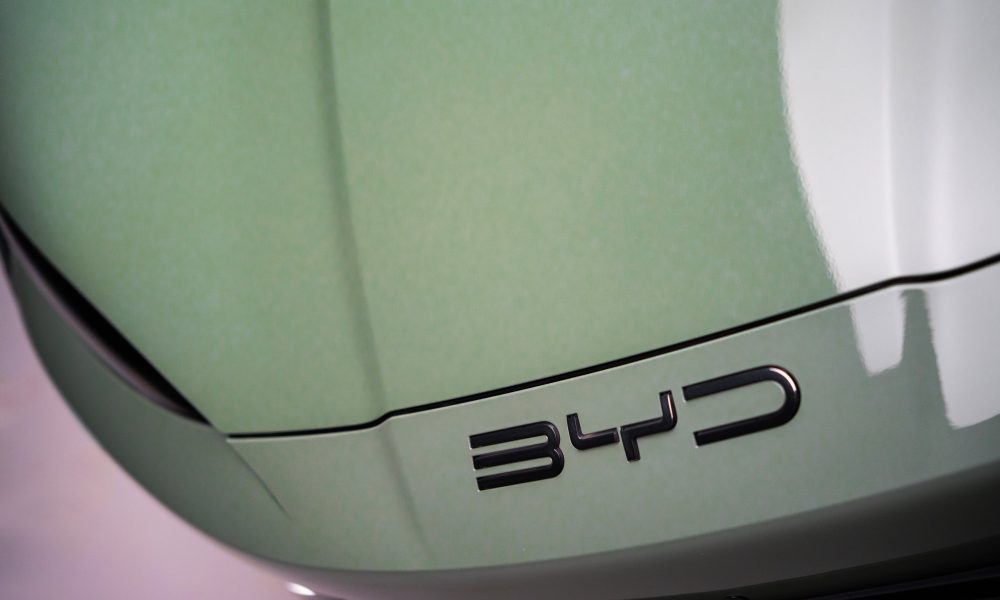BYD's 5-Minute EV Charge: A Game Changer?

Table of Contents
The Technology Behind BYD's Blazing-Fast Charging
BYD's claim of a 5-minute EV charge is undeniably ambitious, demanding a significant leap forward in battery and charging infrastructure technology. Let's examine the key components:
Battery Technology
BYD's success hinges on advanced battery technology, likely incorporating elements of solid-state battery technology or a sophisticated variation thereof. This technology offers several key advantages over current lithium-ion batteries:
- Higher Energy Density: Solid-state batteries can pack more energy into a smaller space, allowing for longer driving ranges on a single charge.
- Improved Safety: Solid-state electrolytes are less flammable than liquid electrolytes found in conventional lithium-ion batteries, reducing the risk of thermal runaway and fires.
- Faster Charging Rates: The unique electrochemical properties of solid-state batteries enable significantly faster charging speeds without compromising battery lifespan.
- Longer Lifespan: While still under development and testing, solid-state batteries show promise for a significantly longer lifespan compared to traditional lithium-ion batteries. This translates to lower long-term replacement costs.
BYD has likely incorporated proprietary technologies within its battery chemistry and cell design, further enhancing its performance and enabling this exceptionally fast charging capability.
Charging Infrastructure
Achieving a 5-minute EV charge necessitates a revolutionary leap in charging infrastructure. This means significantly higher power outputs than currently available, likely requiring:
- New Charging Standards: The existing charging standards (e.g., CCS, CHAdeMO) will likely need adaptation or replacement to handle the immense power demands of 5-minute charging.
- Massive Power Requirements: Charging stations would need to deliver incredibly high power levels, potentially requiring upgrades to the electrical grid infrastructure in many locations.
- Advanced Thermal Management: Handling such high power inputs requires sophisticated thermal management systems to prevent overheating and battery damage.
The widespread implementation of this infrastructure presents immense challenges, including the cost of upgrades, grid capacity limitations, and the need for standardized connectors and protocols.
Safety Concerns and Mitigation
Charging at such high power levels naturally raises safety concerns. BYD addresses these concerns through:
- Advanced Thermal Management Systems: Sophisticated cooling systems prevent overheating during fast charging, protecting the battery and preventing potential hazards.
- Real-Time Monitoring and Control: Advanced sensors and control systems constantly monitor battery temperature, voltage, and current, adjusting charging parameters in real-time to ensure safety.
- Redundant Safety Mechanisms: Multiple safety features work in tandem to prevent overcharging, short circuits, and other potential hazards.
- Robust Battery Packaging: The physical design of the battery pack is optimized for safety, incorporating protective materials and robust casing.
Impact on the EV Market and Consumers
BYD's 5-minute EV charge, if successfully implemented, could transform the electric vehicle landscape:
Reduced Range Anxiety
The most significant impact would be the near-elimination of range anxiety. For consumers, this translates to:
- Increased Convenience: Quick charging stops become as commonplace and brief as filling up a gas tank.
- Longer Journeys: Drivers can confidently undertake longer trips without worrying about finding charging stations.
- Less Reliance on Home Charging: The need for frequent home charging diminishes significantly.
Increased EV Adoption
Reduced charging times are a game-changer for EV adoption. We can anticipate:
- Higher EV Sales: A major barrier to EV adoption—long charging times—is dramatically reduced, potentially leading to a surge in EV sales.
- Market Share Shifts: Manufacturers offering comparable fast-charging technologies will gain a competitive edge.
- Increased Demand for Public Charging Stations: Investment in public charging infrastructure will become even more crucial to meet growing demand.
Economic Implications
The economic impact of BYD's technology is far-reaching:
- Job Creation: The development, manufacturing, and installation of fast-charging infrastructure will create numerous jobs.
- Investment Opportunities: The EV charging sector will attract substantial investment, fueling innovation and growth.
- Potential Challenges: Existing charging infrastructure providers may face challenges adapting to the new technology.
Challenges and Hurdles to Overcome
Despite the immense potential, several hurdles remain:
Scalability and Cost
Scaling up production of BYD's advanced batteries and charging infrastructure presents significant challenges:
- Manufacturing Capacity: Building the necessary manufacturing capacity to meet global demand will require substantial investment and time.
- Raw Material Supply: Securing sufficient quantities of raw materials needed for battery production could become a bottleneck.
- Cost of Technology: The initial cost of the batteries and charging infrastructure may be high, hindering widespread adoption.
Infrastructure Development
The necessary infrastructure upgrades are monumental:
- Grid Capacity Upgrades: The power grid in many areas will need significant upgrades to support the high power demands of widespread fast charging.
- Government Investment: Significant government investment and regulatory support are needed to facilitate infrastructure development.
- Standardization and Interoperability: Establishing global standards for fast charging connectors and protocols is essential.
Battery Lifespan
The impact of rapid charging on battery lifespan is a key concern:
- Degradation Rates: Research is ongoing to determine the long-term impact of frequent, high-power charging on battery performance.
- Battery Management Systems: Advanced battery management systems are crucial to mitigate the effects of rapid charging on battery degradation.
- Recycling and Disposal: Efficient recycling processes are needed to address the potential environmental impact of discarded batteries.
Conclusion: Is BYD's 5-Minute EV Charge Truly a Game Changer?
BYD's 5-minute EV charge technology holds the potential to revolutionize the electric vehicle market, addressing critical barriers to mass adoption. While challenges remain in terms of scalability, cost, and infrastructure development, the potential benefits—reduced range anxiety, increased EV sales, and transformative economic impact—are undeniable. The success of this technology will depend on overcoming these challenges through collaborative efforts between manufacturers, governments, and infrastructure providers. Stay informed about the latest developments in BYD's 5-minute EV charge technology and the ongoing revolution in electric vehicle charging. [Link to relevant BYD resources]

Featured Posts
-
 Hit The Road Drax Performed At 2024 Protest
May 13, 2025
Hit The Road Drax Performed At 2024 Protest
May 13, 2025 -
 Analisis Pertandingan Ac Milan Vs Atalanta Prediksi Skor Head To Head Serta Susunan Pemain
May 13, 2025
Analisis Pertandingan Ac Milan Vs Atalanta Prediksi Skor Head To Head Serta Susunan Pemain
May 13, 2025 -
 Watch Texas Rangers Vs Boston Red Sox Free Mlb Live Stream
May 13, 2025
Watch Texas Rangers Vs Boston Red Sox Free Mlb Live Stream
May 13, 2025 -
 Hollywoods Wage Gap The Colin Jost And Scarlett Johansson Example
May 13, 2025
Hollywoods Wage Gap The Colin Jost And Scarlett Johansson Example
May 13, 2025 -
 Olympus Has Fallen Behind The Scenes Of The Gerard Butler Action Film
May 13, 2025
Olympus Has Fallen Behind The Scenes Of The Gerard Butler Action Film
May 13, 2025
